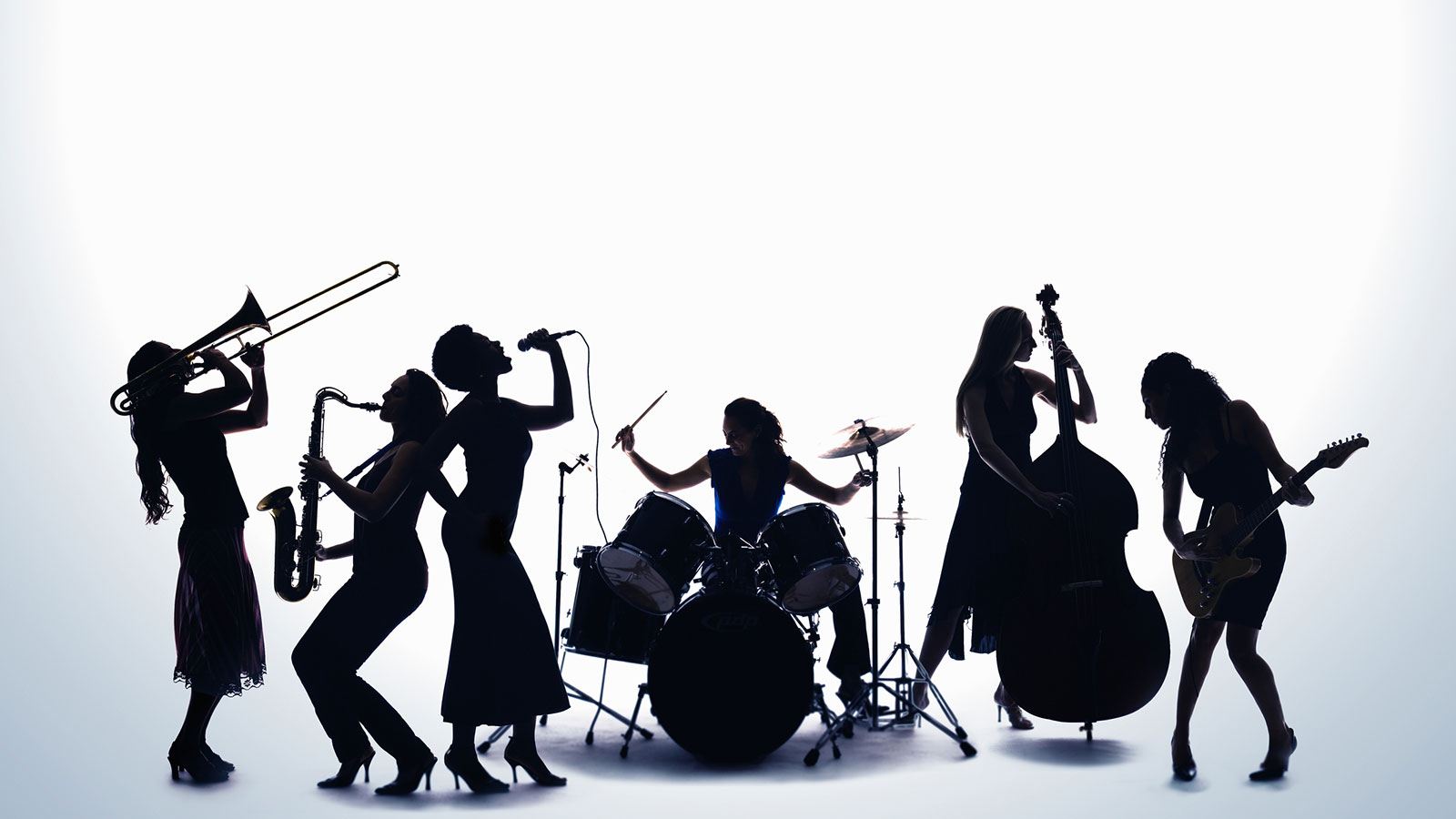5 ways men can be better allies to women in the music industry
Back To Live: The reset for touring and performing is a chance to start making lasting changes

Want all the hottest music and gear news, reviews, deals, features and more, direct to your inbox? Sign up here.
You are now subscribed
Your newsletter sign-up was successful
BACK TO LIVE: In the wake of the Coronavirus pandemic, people around the country are finally starting to plan things again. The prospect of going to see a band - not to mention play some gigs ourselves - is tantalising at this point. But with the return to the live arena, comes the opportunity to make some lasting positive changes – not least in the way we treat and support female colleagues.
As a musician, I have often been struck by the differences in how women are treated, compared with men (especially straight white males; the subset to which I belong). Sometimes these differences in behaviour can be very subtle, or oftentimes downright offensive. Yet whenever we highlight someone’s difference, we are putting them in a position of “other”, which places extra pressure on them to prove themselves.
This is by no means limited to woman in the industry, it also extends to people of colour and anyone who is non-heterosexual or non-cisgender. Music is the universal language, though, so why should any of us be made to feel excluded from the majority conversation?
In both the UK and US, women actually outnumber men in nation's populations and yet this gender split is no way near being reflected in our industry. A recent study by USC Annenberg and Spotify of 900 popular songs found women represented only 22% of artists, 13% of songwriters and a tiny 3% of producers – and those numbers have been rounded-up!
Institutional sexism is undoubtedly alive within the music industry, then. What is important now is our approach to change.
In the wake of the #MeToo movement, men have begun to see how positive the impacts of wider considerations can be. So let’s do our bit to extend this into the music industry. Here, with the help of some female musician friends of mine, are a few adjustments men can make to become better allies to our female colleagues.
1. Play your part in normalising the positive things
At every monumental point in history, mass change has come about by a process of revolution and then normalisation. This means making a concerted effort to cement positive progress into something that is recognised as the new normal.
Want all the hottest music and gear news, reviews, deals, features and more, direct to your inbox? Sign up here.
For example, Stormzy was not a Glastonbury headliner until Glastonbury put him in the headline slot. His set proved to be one of the all time greatest Glasto has ever seen and began to pave the way for a wider acceptance of grime and black British musicians, in the mainstream media and festival headline slots.
Not enough women are encouraged to move into music roles, yet there's no reason why gender should be a participating factor
If Glastonbury were to make a statement with a line-up of all-female headliners, although it might seem forced initially, the long term effects would surely be positive.
The next generation watching at home would see people who look like them being total rockstars and - in turn - perhaps be inspired to try their hand at picking up a guitar, or a pair of sticks.
These actions create forward momentum. It seems like people are starting to understand this, too, with the Grammys this year awarding Best New Artist, Song of the Year and Record of the Year all to female artists.
2. Hire whoever's best for the job, but look wider than your normal circles
A fairly simple change, in practice - and different from what is sometimes called “positive discrimination”. Let’s say, for example, you run a music venue and you need a new sound engineer. You put the advert out, and 15 people apply. Of those 15 people, only three of them are female.
The reason so few of the applicants are female is indicative of the problem, but perhaps you could go a little further with your promotion of the role, reaching out to organisations like Women In Music that champion and promote opportunities to their members.
Even if you are not flooded with female applicants, you can at least make sure that those that do apply are seen for the role and given the same chances to prove themselves.
Not enough women are encouraged to move into roles like this, yet there is no reason why gender should be a participating factor. I spoke to a good friend of mine, Rhii Williams, drummer in Little Thief and various sessions, about this. She shared some very insightful thoughts on this matter.
“When I was younger, I used to actively go against jobs that were recruiting specifically female drummers, because I didn’t want to feel separated. Now, I’ve completely changed my perspective on it and realised that the incremental steps society takes towards normalising these things - specifically women in music - are absolutely essential. Without them, the greater sweeps of change cannot happen.”
3. Challenge yourself and others healthily - and don’t be afraid to slip up
Challenging yourself - and others close to you - can be scary. It can lead to confrontations and uncomfortable conversations. However, these situations often pave the way for small changes in the ways people treat each other; which in turn create the bigger waves of positive momentum.
These conversations need to be handled with respect and come from a place of love, so as not to create a toxic dialogue between men, where things feel like they are divided into ‘sides’.
With that in mind, having a healthy discussion with others about their comments towards female musicians, or even about your own prejudices, is a productive thing to do.
Even if you feel you cannot verbally challenge behaviour, you can still challenge others to do better by trying to be a role model in your own actions – demonstrating to colleagues that there is an alternative way.
If you are able to have a positive conversation with someone close to you and come out of it feeling like something has been learned; you’re helping to move the discussion forward.
Keep going! As a man, institutional sexism is not your personal problem; but the way you deal with it is.
4. Be supportive without being patronising
This might seem like obvious advice to most people but it is crucial if you want to be a better ally.
To put it into perspective, let’s use two examples. Firstly, if you’re a male member of a band, and a sound tech deliberately walks past your female colleague and asks you a question instead of them; politely call the sound tech out on this. Remind them that there is no reason why they couldn’t have asked your colleague, who they encountered first.
Secondly, it is important to be mindful of the way you speak. If your drummer needs a hand getting her kit up a flight of stairs, by all means help her out! Drums are a cumbersome instrument, after all.
We need to enforce ideals that allow the next generation to step into a more welcoming music industry
However, try not to say something like “Let me get that for you”, or “I’ll do that” – although your intentions might be good, it can sound condescending. A simple change of wording can make all the difference.
“Do you want a hand with that stuff?” does not sound condescending, or any different to how you would speak to a male drummer. It’s the difference in attitude between expecting someone needs help or asking if they would like it.
Tess Tyler is an accomplished Film and Video Game composer, who also sits on the committee of media composers for the Ivors Academy. She told me how she had found it challenging in the past to be a women in a hugely male-dominated niche.
Despite being exceptionally skilled - and in some cases downright over-qualified - she has still been subject to condescension, patronisation and sexism in the workplace.
One incident she recounted involved someone literally patting her on the leg and calling her a “smart cookie” during a business meeting. Suffice to say, this is not how professional adults talk to each other.
5. Welcome change. Don’t fear it
Positive change takes time and is a continuing process. It should be something that we are always striving for, not running from.
All musicians know that you cannot learn without making mistakes. Progress works the same way. We must accept that our assumptions won't always be right and be happy to be proved wrong. It is not a 'one and done'. We need to keep talking, keep the conversation positive and, most importantly, keep listening to female colleagues.
As we make these positive steps, we enforce ideals that allow the next generation to step into a more inclusive, welcoming and, ultimately, exciting music industry. As we move out of this pandemic and start to get back onto the stage, let’s make sure we keep these things in mind and do our bit to help.
Jai is a drummer and producer, who has worked with Afrika Baby Bam, Jay Z, Tyler the Creator and more. When he's not in the studio or away on tour, Jai writes for MusicRadar, specialising in drums, touring and mental health within the music industry. Outside of music he enjoys coffee, video games, sports and dogs.
